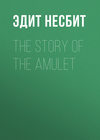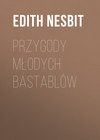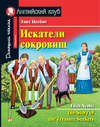Czytaj książkę: «The Story of the Amulet», strona 7
CHAPTER 8. THE QUEEN IN LONDON
‘Now tell us what happened to you,’ said Cyril to Jane, when he and the others had told her all about the Queen’s talk and the banquet, and the variety entertainment, carefully stopping short before the beginning of the dungeon part of the story.
‘It wasn’t much good going,’ said Jane, ‘if you didn’t even try to get the Amulet.’
‘We found out it was no go,’ said Cyril; ‘it’s not to be got in Babylon. It was lost before that. We’ll go to some other jolly friendly place, where everyone is kind and pleasant, and look for it there. Now tell us about your part.’
‘Oh,’ said Jane, ‘the Queen’s man with the smooth face—what was his name?’
‘Ritti-Marduk,’ said Cyril.
‘Yes,’ said Jane, ‘Ritti-Marduk, he came for me just after the Psammead had bitten the guard-of-the-gate’s wife’s little boy, and he took me to the Palace. And we had supper with the new little Queen from Egypt. She is a dear—not much older than you. She told me heaps about Egypt. And we played ball after supper. And then the Babylon Queen sent for me. I like her too. And she talked to the Psammead and I went to sleep. And then you woke me up. That’s all.’
The Psammead, roused from its sound sleep, told the same story.
‘But,’ it added, ‘what possessed you to tell that Queen that I could give wishes? I sometimes think you were born without even the most rudimentary imitation of brains.’
The children did not know the meaning of rudimentary, but it sounded a rude, insulting word.
‘I don’t see that we did any harm,’ said Cyril sulkily.
‘Oh, no,’ said the Psammead with withering irony, ‘not at all! Of course not! Quite the contrary! Exactly so! Only she happened to wish that she might soon find herself in your country. And soon may mean any moment.’
‘Then it’s your fault,’ said Robert, ‘because you might just as well have made “soon” mean some moment next year or next century.’
‘That’s where you, as so often happens, make the mistake,’ rejoined the Sand-fairy. ‘I couldn’t mean anything but what SHE meant by “soon”. It wasn’t my wish. And what SHE meant was the next time the King happens to go out lion hunting. So she’ll have a whole day, and perhaps two, to do as she wishes with. SHE doesn’t know about time only being a mode of thought.’
‘Well,’ said Cyril, with a sigh of resignation, ‘we must do what we can to give her a good time. She was jolly decent to us. I say, suppose we were to go to St James’s Park after dinner and feed those ducks that we never did feed. After all that Babylon and all those years ago, I feel as if I should like to see something REAL, and NOW. You’ll come, Psammead?’
‘Where’s my priceless woven basket of sacred rushes?’ asked the Psammead morosely. ‘I can’t go out with nothing on. And I won’t, what’s more.’
And then everybody remembered with pain that the bass bag had, in the hurry of departure from Babylon, not been remembered.
‘But it’s not so extra precious,’ said Robert hastily. ‘You can get them given to you for nothing if you buy fish in Farringdon Market.’
‘Oh,’ said the Psammead very crossly indeed, ‘so you presume on my sublime indifference to the things of this disgusting modern world, to fob me off with a travelling equipage that costs you nothing. Very well, I shall go to sand. Please don’t wake me.’
And it went then and there to sand, which, as you know, meant to bed. The boys went to St James’s Park to feed the ducks, but they went alone.
Anthea and Jane sat sewing all the afternoon. They cut off half a yard from each of their best green Liberty sashes. A towel cut in two formed a lining; and they sat and sewed and sewed and sewed. What they were making was a bag for the Psammead. Each worked at a half of the bag. jane’s half had four-leaved shamrocks embroidered on it. They were the only things she could do (because she had been taught how at school, and, fortunately, some of the silk she had been taught with was left over). And even so, Anthea had to draw the pattern for her. Anthea’s side of the bag had letters on it—worked hastily but affectionately in chain stitch. They were something like this:
PSAMS TRAVEL CAR
She would have put ‘travelling carriage’, but she made the letters too big, so there was no room. The bag was made INTO a bag with old Nurse’s sewing machine, and the strings of it were Anthea’s and Jane’s best red hair ribbons. At tea-time, when the boys had come home with a most unfavourable report of the St james’s Park ducks, Anthea ventured to awaken the Psammead, and to show it its new travelling bag.
‘Humph,’ it said, sniffing a little contemptuously, yet at the same time affectionately, ‘it’s not so dusty.’
The Psammead seemed to pick up very easily the kind of things that people said nowadays. For a creature that had in its time associated with Megatheriums and Pterodactyls, its quickness was really wonderful.
‘It’s more worthy of me,’ it said, ‘than the kind of bag that’s given away with a pound of plaice. When do you propose to take me out in it?’
‘I should like a rest from taking you or us anywhere,’ said Cyril. But Jane said—
‘I want to go to Egypt. I did like that Egyptian Princess that came to marry the King in Babylon. She told me about the larks they have in Egypt. And the cats. Do let’s go there. And I told her what the bird things on the Amulet were like. And she said it was Egyptian writing.’
The others exchanged looks of silent rejoicing at the thought of their cleverness in having concealed from Jane the terrors they had suffered in the dungeon below the Euphrates.
‘Egypt’s so nice too,’ Jane went on, ‘because of Doctor Brewer’s Scripture History. I would like to go there when Joseph was dreaming those curious dreams, or when Moses was doing wonderful things with snakes and sticks.’
‘I don’t care about snakes,’ said Anthea shuddering.
‘Well, we needn’t be in at that part, but Babylon was lovely! We had cream and sweet, sticky stuff. And I expect Egypt’s the same.’
There was a good deal of discussion, but it all ended in everybody’s agreeing to Jane’s idea. And next morning directly after breakfast (which was kippers and very nice) the Psammead was invited to get into his travelling carriage.
The moment after it had done so, with stiff, furry reluctance, like that of a cat when you want to nurse it, and its ideas are not the same as yours, old Nurse came in.
‘Well, chickies,’ she said, ‘are you feeling very dull?’
‘Oh, no, Nurse dear,’ said Anthea; ‘we’re having a lovely time. We’re just going off to see some old ancient relics.’
‘Ah,’ said old Nurse, ‘the Royal Academy, I suppose? Don’t go wasting your money too reckless, that’s all.’
She cleared away the kipper bones and the tea-things, and when she had swept up the crumbs and removed the cloth, the Amulet was held up and the order given—just as Duchesses (and other people) give it to their coachmen.
‘To Egypt, please!’ said Anthea, when Cyril had uttered the wonderful Name of Power.
‘When Moses was there,’ added Jane.
And there, in the dingy Fitzroy Street dining-room, the Amulet grew big, and it was an arch, and through it they saw a blue, blue sky and a running river.
‘No, stop!’ said Cyril, and pulled down jane’s hand with the Amulet in it.
‘What silly cuckoos we all are,’ he said. ‘Of course we can’t go. We daren’t leave home for a single minute now, for fear that minute should be THE minute.’
‘What minute be WHAT minute?’ asked Jane impatiently, trying to get her hand away from Cyril.
‘The minute when the Queen of Babylon comes,’ said Cyril. And then everyone saw it.
For some days life flowed in a very slow, dusty, uneventful stream.
The children could never go out all at once, because they never knew when the King of Babylon would go out lion hunting and leave his Queen free to pay them that surprise visit to which she was, without doubt, eagerly looking forward.
So they took it in turns, two and two, to go out and to stay in.
The stay-at-homes would have been much duller than they were but for the new interest taken in them by the learned gentleman.
He called Anthea in one day to show her a beautiful necklace of purple and gold beads.
‘I saw one like that,’ she said, ‘in—’
‘In the British Museum, perhaps?’
‘I like to call the place where I saw it Babylon,’ said Anthea cautiously.
‘A pretty fancy,’ said the learned gentleman, ‘and quite correct too, because, as a matter of fact, these beads did come from Babylon.’ The other three were all out that day. The boys had been going to the Zoo, and Jane had said so plaintively, ‘I’m sure I am fonder of rhinoceroses than either of you are,’ that Anthea had told her to run along then. And she had run, catching the boys before that part of the road where Fitzroy Street suddenly becomes Fitzroy Square.
‘I think Babylon is most frightfully interesting,’ said Anthea. ‘I do have such interesting dreams about it—at least, not dreams exactly, but quite as wonderful.’
‘Do sit down and tell me,’ said he. So she sat down and told. And he asked her a lot of questions, and she answered them as well as she could.
‘Wonderful—wonderful!’ he said at last. ‘One’s heard of thought-transference, but I never thought I had any power of that sort. Yet it must be that, and very bad for YOU, I should think. Doesn’t your head ache very much?’
He suddenly put a cold, thin hand on her forehead.
‘No thank you, not at all,’ said she.
‘I assure you it is not done intentionally,’ he went on. ‘Of course I know a good deal about Babylon, and I unconsciously communicate it to you; you’ve heard of thought-reading, but some of the things you say, I don’t understand; they never enter my head, and yet they’re so astoundingly probable.’
‘It’s all right,’ said Anthea reassuringly. ‘I understand. And don’t worry. It’s all quite simple really.’
It was not quite so simple when Anthea, having heard the others come in, went down, and before she had had time to ask how they had liked the Zoo, heard a noise outside, compared to which the wild beasts’ noises were gentle as singing birds.
‘Good gracious!’ cried Anthea, ‘what’s that?’
The loud hum of many voices came through the open window. Words could be distinguished.
‘’Ere’s a guy!’
‘This ain’t November. That ain’t no guy. It’s a ballet lady, that’s what it is.’
‘Not it—it’s a bloomin’ looney, I tell you.’
Then came a clear voice that they knew.
‘Retire, slaves!’ it said.
‘What’s she a saying of?’ cried a dozen voices. ‘Some blamed foreign lingo,’ one voice replied.
The children rushed to the door. A crowd was on the road and pavement.
In the middle of the crowd, plainly to be seen from the top of the steps, were the beautiful face and bright veil of the Babylonian Queen.
‘Jimminy!’ cried Robert, and ran down the steps, ‘here she is!’
‘Here!’ he cried, ‘look out—let the lady pass. She’s a friend of ours, coming to see us.’
‘Nice friend for a respectable house,’ snorted a fat woman with marrows on a handcart.
All the same the crowd made way a little. The Queen met Robert on the pavement, and Cyril joined them, the Psammead bag still on his arm.
‘Here,’ he whispered; ‘here’s the Psammead; you can get wishes.’
‘I wish you’d come in a different dress, if you HAD to come,’ said Robert; ‘but it’s no use my wishing anything.’
‘No,’ said the Queen. ‘I wish I was dressed—no, I don’t—I wish THEY were dressed properly, then they wouldn’t be so silly.’
The Psammead blew itself out till the bag was a very tight fit for it; and suddenly every man, woman, and child in that crowd felt that it had not enough clothes on. For, of course, the Queen’s idea of proper dress was the dress that had been proper for the working-classes 3,000 years ago in Babylon—and there was not much of it.
‘Lawky me!’ said the marrow-selling woman, ‘whatever could a-took me to come out this figure?’ and she wheeled her cart away very quickly indeed.
‘Someone’s made a pretty guy of you—talk of guys,’ said a man who sold bootlaces.
‘Well, don’t you talk,’ said the man next to him. ‘Look at your own silly legs; and where’s your boots?’
‘I never come out like this, I’ll take my sacred,’ said the bootlace-seller. ‘I wasn’t quite myself last night, I’ll own, but not to dress up like a circus.’
The crowd was all talking at once, and getting rather angry. But no one seemed to think of blaming the Queen.
Anthea bounded down the steps and pulled her up; the others followed, and the door was shut. ‘Blowed if I can make it out!’ they heard. ‘I’m off home, I am.’
And the crowd, coming slowly to the same mind, dispersed, followed by another crowd of persons who were not dressed in what the Queen thought was the proper way.
‘We shall have the police here directly,’ said Anthea in the tones of despair. ‘Oh, why did you come dressed like that?’
The Queen leaned against the arm of the horse-hair sofa.
‘How else can a queen dress I should like to know?’ she questioned.
‘Our Queen wears things like other people,’ said Cyril.
‘Well, I don’t. And I must say,’ she remarked in an injured tone, ‘that you don’t seem very glad to see me now I HAVE come. But perhaps it’s the surprise that makes you behave like this. Yet you ought to be used to surprises. The way you vanished! I shall never forget it. The best magic I’ve ever seen. How did you do it?’
‘Oh, never mind about that now,’ said Robert. ‘You see you’ve gone and upset all those people, and I expect they’ll fetch the police. And we don’t want to see you collared and put in prison.’
‘You can’t put queens in prison,’ she said loftily. ‘Oh, can’t you?’ said Cyril. ‘We cut off a king’s head here once.’
‘In this miserable room? How frightfully interesting.’
‘No, no, not in this room; in history.’
‘Oh, in THAT,’ said the Queen disparagingly. ‘I thought you’d done it with your own hands.’
The girls shuddered.
‘What a hideous city yours is,’ the Queen went on pleasantly, ‘and what horrid, ignorant people. Do you know they actually can’t understand a single word I say.’
‘Can you understand them?’ asked Jane.
‘Of course not; they speak some vulgar, Northern dialect. I can understand YOU quite well.’
I really am not going to explain AGAIN how it was that the children could understand other languages than their own so thoroughly, and talk them, too, so that it felt and sounded (to them) just as though they were talking English.
‘Well,’ said Cyril bluntly, ‘now you’ve seen just how horrid it is, don’t you think you might as well go home again?’ ‘Why, I’ve seen simply nothing yet,’ said the Queen, arranging her starry veil. ‘I wished to be at your door, and I was. Now I must go and see your King and Queen.’
‘Nobody’s allowed to,’ said Anthea in haste; ‘but look here, we’ll take you and show you anything you’d like to see—anything you CAN see,’ she added kindly, because she remembered how nice the Queen had been to them in Babylon, even if she had been a little deceitful in the matter of Jane and Psammead.
‘There’s the Museum,’ said Cyril hopefully; ‘there are lots of things from your country there. If only we could disguise you a little.’
‘I know,’ said Anthea suddenly. ‘Mother’s old theatre cloak, and there are a lot of her old hats in the big box.’
The blue silk, lace-trimmed cloak did indeed hide some of the Queen’s startling splendours, but the hat fitted very badly. It had pink roses in it; and there was something about the coat or the hat or the Queen, that made her look somehow not very respectable.
‘Oh, never mind,’ said Anthea, when Cyril whispered this. ‘The thing is to get her out before Nurse has finished her forty winks. I should think she’s about got to the thirty-ninth wink by now.’
‘Come on then,’ said Robert. ‘You know how dangerous it is. Let’s make haste into the Museum. If any of those people you made guys of do fetch the police, they won’t think of looking for you there.’
The blue silk coat and the pink-rosed hat attracted almost as much attention as the royal costume had done; and the children were uncommonly glad to get out of the noisy streets into the grey quiet of the Museum.
‘Parcels and umbrellas to be left here,’ said a man at the counter.
The party had no umbrellas, and the only parcel was the bag containing the Psammead, which the Queen had insisted should be brought.
‘I’M not going to be left,’ said the Psammead softly, ‘so don’t you think it.’
‘I’ll wait outside with you,’ said Anthea hastily, and went to sit on the seat near the drinking fountain.
‘Don’t sit so near that nasty fountain,’ said the creature crossly; ‘I might get splashed.’
Anthea obediently moved to another seat and waited. Indeed she waited, and waited, and waited, and waited, and waited. The Psammead dropped into an uneasy slumber. Anthea had long ceased to watch the swing-door that always let out the wrong person, and she was herself almost asleep, and still the others did not come back.
It was quite a start when Anthea suddenly realized that they HAD come back, and that they were not alone. Behind them was quite a crowd of men in uniform, and several gentlemen were there. Everyone seemed very angry.
‘Now go,’ said the nicest of the angry gentlemen. ‘Take the poor, demented thing home and tell your parents she ought to be properly looked after.’
‘If you can’t get her to go we must send for the police,’ said the nastiest gentleman.
‘But we don’t wish to use harsh measures,’ added the nice one, who was really very nice indeed, and seemed to be over all the others.
‘May I speak to my sister a moment first?’ asked Robert.
The nicest gentleman nodded, and the officials stood round the Queen, the others forming a sort of guard while Robert crossed over to Anthea.
‘Everything you can think of,’ he replied to Anthea’s glance of inquiry. ‘Kicked up the most frightful shine in there. Said those necklaces and earrings and things in the glass cases were all hers—would have them out of the cases. Tried to break the glass—she did break one bit! Everybody in the place has been at her. No good. I only got her out by telling her that was the place where they cut queens’ heads off.’
‘Oh, Bobs, what a whacker!’
‘You’d have told a whackinger one to get her out. Besides, it wasn’t. I meant MUMMY queens. How do you know they don’t cut off mummies’ heads to see how the embalming is done? What I want to say is, can’t you get her to go with you quietly?’
‘I’ll try,’ said Anthea, and went up to the Queen.
‘Do come home,’ she said; ‘the learned gentleman in our house has a much nicer necklace than anything they’ve got here. Come and see it.’
The Queen nodded.
‘You see,’ said the nastiest gentleman, ‘she does understand English.’
‘I was talking Babylonian, I think,’ said Anthea bashfully.
‘My good child,’ said the nice gentleman, ‘what you’re talking is not Babylonian, but nonsense. You just go home at once, and tell your parents exactly what has happened.’
Anthea took the Queen’s hand and gently pulled her away. The other children followed, and the black crowd of angry gentlemen stood on the steps watching them. It was when the little party of disgraced children, with the Queen who had disgraced them, had reached the middle of the courtyard that her eyes fell on the bag where the Psammead was. She stopped short.
‘I wish,’ she said, very loud and clear, ‘that all those Babylonian things would come out to me here—slowly, so that those dogs and slaves can see the working of the great Queen’s magic.’
‘Oh, you ARE a tiresome woman,’ said the Psammead in its bag, but it puffed itself out.
Next moment there was a crash. The glass swing doors and all their framework were smashed suddenly and completely. The crowd of angry gentlemen sprang aside when they saw what had done this.
But the nastiest of them was not quick enough, and he was roughly pushed out of the way by an enormous stone bull that was floating steadily through the door. It came and stood beside the Queen in the middle of the courtyard.
It was followed by more stone images, by great slabs of carved stone, bricks, helmets, tools, weapons, fetters, wine-jars, bowls, bottles, vases, jugs, saucers, seals, and the round long things, something like rolling pins with marks on them like the print of little bird-feet, necklaces, collars, rings, armlets, earrings—heaps and heaps and heaps of things, far more than anyone had time to count, or even to see distinctly.
All the angry gentlemen had abruptly sat down on the Museum steps except the nice one. He stood with his hands in his pockets just as though he was quite used to seeing great stone bulls and all sorts of small Babylonish objects float out into the Museum yard.
But he sent a man to close the big iron gates.
A journalist, who was just leaving the museum, spoke to Robert as he passed.
‘Theosophy, I suppose?’ he said. ‘Is she Mrs Besant?’
‘YES,’ said Robert recklessly.
The journalist passed through the gates just before they were shut.
He rushed off to Fleet Street, and his paper got out a new edition within half an hour.
MRS BESANT AND THEOSOPHY
IMPERTINENT MIRACLE AT THE BRITISH MUSEUM
People saw it in fat, black letters on the boards carried by the sellers of newspapers. Some few people who had nothing better to do went down to the Museum on the tops of omnibuses. But by the time they got there there was nothing to be seen. For the Babylonian Queen had suddenly seen the closed gates, had felt the threat of them, and had said—
‘I wish we were in your house.’
And, of course, instantly they were.
The Psammead was furious.
‘Look here,’ it said, ‘they’ll come after you, and they’ll find ME. There’ll be a National Cage built for me at Westminster, and I shall have to work at politics. Why wouldn’t you leave the things in their places?’
‘What a temper you have, haven’t you?’ said the Queen serenely. ‘I wish all the things were back in their places. Will THAT do for you?’
The Psammead swelled and shrank and spoke very angrily.
‘I can’t refuse to give your wishes,’ it said, ‘but I can Bite. And I will if this goes on. Now then.’
‘Ah, don’t,’ whispered Anthea close to its bristling ear; ‘it’s dreadful for us too. Don’t YOU desert us. Perhaps she’ll wish herself at home again soon.’
‘Not she,’ said the Psammead a little less crossly.
‘Take me to see your City,’ said the Queen.
The children looked at each other.
‘If we had some money we could take her about in a cab. People wouldn’t notice her so much then. But we haven’t.’
‘Sell this,’ said the Queen, taking a ring from her finger.
‘They’d only think we’d stolen it,’ said Cyril bitterly, ‘and put us in prison.’
‘All roads lead to prison with you, it seems,’ said the Queen.
‘The learned gentleman!’ said Anthea, and ran up to him with the ring in her hand.
‘Look here,’ she said, ‘will you buy this for a pound?’
‘Oh!’ he said in tones of joy and amazement, and took the ring into his hand. ‘It’s my very own,’ said Anthea; ‘it was given to me to sell.’
‘I’ll lend you a pound,’ said the learned gentleman, ‘with pleasure; and I’ll take care of the ring for you. Who did you say gave it to you?’
‘We call her,’ said Anthea carefully, ‘the Queen of Babylon.’
‘Is it a game?’ he asked hopefully.
‘It’ll be a pretty game if I don’t get the money to pay for cabs for her,’ said Anthea.
‘I sometimes think,’ he said slowly, ‘that I am becoming insane, or that—’
‘Or that I am; but I’m not, and you’re not, and she’s not.’
‘Does she SAY that she’s the Queen of Babylon?’ he uneasily asked.
‘Yes,’ said Anthea recklessly.
‘This thought-transference is more far-reaching than I imagined,’ he said. ‘I suppose I have unconsciously influenced HER, too. I never thought my Babylonish studies would bear fruit like this. Horrible! There are more things in heaven and earth—’
‘Yes,’ said Anthea, ‘heaps more. And the pound is the thing I want more than anything on earth.’
He ran his fingers through his thin hair.
‘This thought-transference!’ he said. ‘It’s undoubtedly a Babylonian ring—or it seems so to me. But perhaps I have hypnotized myself. I will see a doctor the moment I have corrected the last proofs of my book.’
‘Yes, do!’ said Anthea, ‘and thank you so very much.’
She took the sovereign and ran down to the others.
And now from the window of a four-wheeled cab the Queen of Babylon beheld the wonders of London. Buckingham Palace she thought uninteresting; Westminster Abbey and the Houses of Parliament little better. But she liked the Tower, and the River, and the ships filled her with wonder and delight.
‘But how badly you keep your slaves. How wretched and poor and neglected they seem,’ she said, as the cab rattled along the Mile End Road.
‘They aren’t slaves; they’re working-people,’ said Jane.
‘Of course they’re working. That’s what slaves are. Don’t you tell me. Do you suppose I don’t know a slave’s face when I see it?
Why don’t their masters see that they’re better fed and better clothed? Tell me in three words.’
No one answered. The wage-system of modern England is a little difficult to explain in three words even if you understand it—which the children didn’t.
‘You’ll have a revolt of your slaves if you’re not careful,’ said the Queen.
‘Oh, no,’ said Cyril; ‘you see they have votes—that makes them safe not to revolt. It makes all the difference. Father told me so.’
‘What is this vote?’ asked the Queen. ‘Is it a charm? What do they do with it?’
‘I don’t know,’ said the harassed Cyril; ‘it’s just a vote, that’s all! They don’t do anything particular with it.’
‘I see,’ said the Queen; ‘a sort of plaything. Well, I wish that all these slaves may have in their hands this moment their fill of their favourite meat and drink.’
Instantly all the people in the Mile End Road, and in all the other streets where poor people live, found their hands full of things to eat and drink. From the cab window could be seen persons carrying every kind of food, and bottles and cans as well. Roast meat, fowls, red lobsters, great yellowy crabs, fried fish, boiled pork, beef-steak puddings, baked onions, mutton pies; most of the young people had oranges and sweets and cake. It made an enormous change in the look of the Mile End Road—brightened it up, so to speak, and brightened up, more than you can possibly imagine, the faces of the people.
‘Makes a difference, doesn’t it?’ said the Queen.
‘That’s the best wish you’ve had yet,’ said Jane with cordial approval.
just by the Bank the cabman stopped.
‘I ain’t agoin’ to drive you no further,’ he said. ‘Out you gets.’
They got out rather unwillingly.
‘I wants my tea,’ he said; and they saw that on the box of the cab was a mound of cabbage, with pork chops and apple sauce, a duck, and a spotted currant pudding. Also a large can.
‘You pay me my fare,’ he said threateningly, and looked down at the mound, muttering again about his tea.
‘We’ll take another cab,’ said Cyril with dignity. ‘Give me change for a sovereign, if you please.’
But the cabman, as it turned out, was not at all a nice character. He took the sovereign, whipped up his horse, and disappeared in the stream of cabs and omnibuses and wagons, without giving them any change at all.
Already a little crowd was collecting round the party.
‘Come on,’ said Robert, leading the wrong way.
The crowd round them thickened. They were in a narrow street where many gentlemen in black coats and without hats were standing about on the pavement talking very loudly.
‘How ugly their clothes are,’ said the Queen of Babylon. ‘They’d be rather fine men, some of them, if they were dressed decently, especially the ones with the beautiful long, curved noses. I wish they were dressed like the Babylonians of my court.’
And of course, it was so.
The moment the almost fainting Psammead had blown itself out every man in Throgmorton Street appeared abruptly in Babylonian full dress.
All were carefully powdered, their hair and beards were scented and curled, their garments richly embroidered. They wore rings and armlets, flat gold collars and swords, and impossible-looking head-dresses.
A stupefied silence fell on them.
‘I say,’ a youth who had always been fair-haired broke that silence, ‘it’s only fancy of course—something wrong with my eyes—but you chaps do look so rum.’
‘Rum,’ said his friend. ‘Look at YOU. You in a sash! My hat! And your hair’s gone black and you’ve got a beard. It’s my belief we’ve been poisoned. You do look a jackape.’
‘Old Levinstein don’t look so bad. But how was it DONE—that’s what I want to know. How was it done? Is it conjuring, or what?’
‘I think it is chust a ver’ bad tream,’ said old Levinstein to his clerk; ‘all along Bishopsgate I haf seen the gommon people have their hants full of food—GOOT food. Oh yes, without doubt a very bad tream!’
‘Then I’m dreaming too, Sir,’ said the clerk, looking down at his legs with an expression of loathing. ‘I see my feet in beastly sandals as plain as plain.’
‘All that goot food wasted,’ said old Mr Levinstein. A bad tream—a bad tream.’
The Members of the Stock Exchange are said to be at all times a noisy lot. But the noise they made now to express their disgust at the costumes of ancient Babylon was far louder than their ordinary row. One had to shout before one could hear oneself speak.
‘I only wish,’ said the clerk who thought it was conjuring—he was quite close to the children and they trembled, because they knew that whatever he wished would come true. ‘I only wish we knew who’d done it.’
And, of course, instantly they did know, and they pressed round the Queen.
‘Scandalous! Shameful! Ought to be put down by law. Give her in charge. Fetch the police,’ two or three voices shouted at once.
The Queen recoiled.
‘What is it?’ she asked. ‘They sound like caged lions—lions by the thousand. What is it that they say?’
‘They say “Police!”,’ said Cyril briefly. ‘I knew they would sooner or later. And I don’t blame them, mind you.’
‘I wish my guards were here!’ cried the Queen. The exhausted Psammead was panting and trembling, but the Queen’s guards in red and green garments, and brass and iron gear, choked Throgmorton Street, and bared weapons flashed round the Queen.
‘I’m mad,’ said a Mr Rosenbaum; ‘dat’s what it is—mad!’
‘It’s a judgement on you, Rosy,’ said his partner. ‘I always said you were too hard in that matter of Flowerdew. It’s a judgement, and I’m in it too.’



















